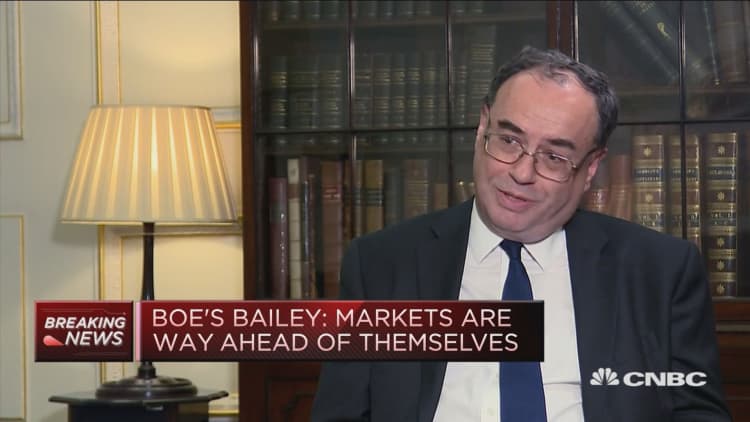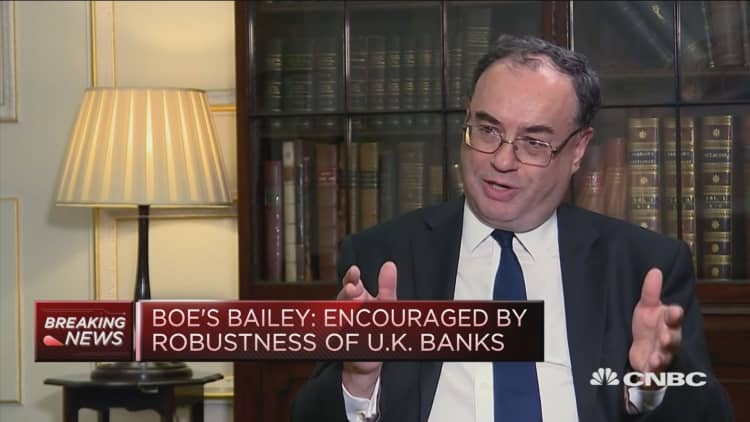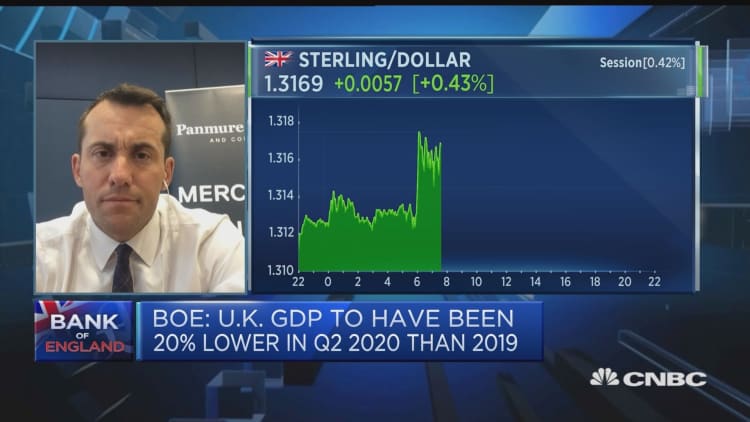Bank of England Governor Andrew Bailey told CNBC Thursday that there are no plans to deploy negative interest rates in the coming months, despite the U.K. central bank's "constrained position."
His comments came shortly after the BOE's Monetary Policy Committee voted unanimously to keep benchmark interest rates at an all-time low of 0.1%.
Policymakers also decided to leave the size of the central bank's bond-buying program unchanged at £745 billion ($981 billion).

Sterling climbed 0.4% to notch a fresh five-month high of $1.3184 shortly after the announcement. The U.K. currency has since pared gains.
When asked during an interview with CNBC's Geoff Cutmore whether the bank would consider negative interest rates next year, Bailey replied: "No, I can't give you that because I would never give you a judgement on what monetary policy is going to be a year ahead before we get there."
"What I can tell you is that other analysts are essentially right, in the sense of saying it is in the toolbox. But, there is no plan at the moment to bring it out of the toolbox and put it to work," Bailey said.
"We've looked at the experience of other central banks," he added, highlighting that many central banks across continental Europe are either currently using negative interest rates or have done so previously.
"I think there is a close relationship between the effectiveness of negative interest rates and the structure of the banking system, particularly the amount of retail funding. And also, the point in the economic cycle at which they have been used in different countries," Bailey continued.
"Looking at that and looking at our situation, it makes sense to say: Look, we need as many tools in the box as we can get at the moment because obviously, we are in a constrained position with interest rates as low as they are," Bailey said.
"I would also caution anybody who thinks that that means we are about to pull them out of the box and put them to work. That is not what we are discussing at the moment."

BOE forecast 'too optimistic'
The BOE said on Thursday that the U.K.'s gross domestic product (GDP) was expected to have fallen 20% in the second quarter when compared to the final three months of last year. The Monetary Policy Committee's updated central projection was for U.K. GDP to continue to recover beyond the near term, but it warned that the economy was unlikely to exceed its pre-pandemic level until the end of 2021.
"It still looks too optimistic to me," Simon French, chief economist at Panmure Gordon, told CNBC's "Squawk Box Europe" on Thursday.
If the BOE's revised economic forecast plays out, he argued, it would mark "the fastest recovery to pre-recession levels for 50 years."
"An end of 2021 return to Q4 2019 output is about a year-and-a-half earlier than we have in our forecasts," French said. "I think the scarring to the U.K. labour market will more significant, there will be a significant rotation of capital and labour to the new patterns of economic demand and that all takes time."

The BOE said employment rates in the U.K. appeared to have fallen in the wake of the coronavirus pandemic, although this had been "very significantly mitigated" by the extraordinary temporary support schemes imposed by the government.
Nonetheless, it warned of "considerable uncertainty" for employment as Downing Street prepares to bring an end to those same support measures.
"In the near term, the unemployment rate is projected to rise materially," the Bank said, predicting the rate to climb to around 7.5% by the end of the year, "consistent with a material degree of spare capacity."


